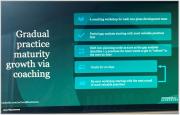Written by Lakisia Jones PMP, CSM
Presentation Overview
Larry Maccherone, founder of Transformation.dev, presented a 5-step approach to change the culture of development teams. This 5-step approach can be launched and scaled across all development teams in the organization. 
Takeaways
- Getting people to change their mindset is one of the biggest challenges to transforming culture
- Target gradual improvements initially that will ultimately get to culture change
- Words matter because words used carefully reveal how one thinks
- Create a list of company practices and adopt them
- Practice the adoption states: Thoughts->Words->Action->Culture
- Coaching
- Work with the development team to pick 3 practices to adopt
- Sit with the team every 90 days and discuss the list of practices with them
- At the end of the conversation the coach should have a good feel for how the team feels about the practices selected for adoption
- Assess where the team is in adopting the practices
- Go into coaching mode for the next 90 days, then reassess with the team after 90 days
- Repeat the process with other development teams
- At Comcast, it took 1 ½ years to go from low maturity to high maturity
- Use metrics and visualization to build sponsorship
- The defect/vulnerability/incident 3-step process:
- Fix it
- Find and fix others like it
- Prevent future occurrence
Next Event
Join us at the next PMI Atlanta joint Agile Forum with the Governance Forum on Wednesday, May 25, 2022.
Register at www.pmiatlanta.org/events/event-calendar










